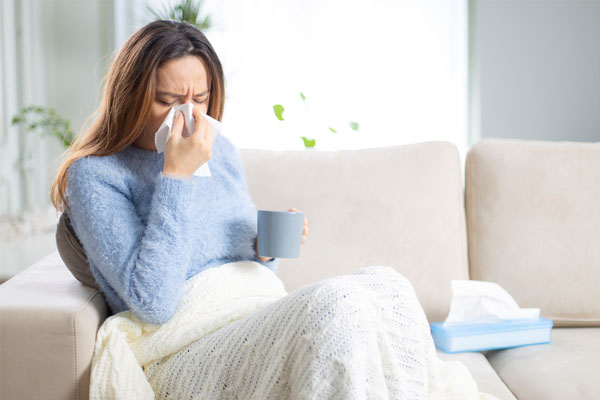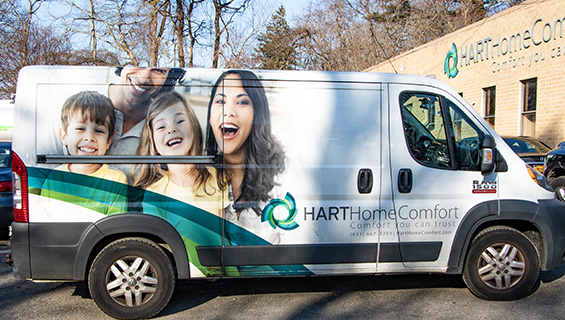Unveiling the Health Implications of Subpar Indoor Air Quality

Understanding that we typically spend the vast majority of our time indoors, where the air is often significantly more polluted than outdoor air, highlights the crucial role indoor air quality has in our well-being. The air we breathe in our homes, offices, and other indoor spaces plays a direct and significant role in our health. Despite its importance, the air quality inside our buildings is frequently overlooked. This means that poor indoor air quality symptoms are often ignored, taking a toll on our health.
This article will uncover the true nature of indoor air quality (IAQ) and its impact on health, emphasizing the importance of maintaining high-quality air, especially concerning heating system longevity. Hart Home Comfort is dedicated to ensuring your indoor air is as fresh and healthy as possible, recognizing that this is a comfort issue and a crucial health consideration.
Introduction to Indoor Air Quality
Table of Contents
IAQ refers to the air quality within enclosed spaces and surrounding buildings and structures, focusing mainly on how it affects the health and comfort of those inside. Several factors, such as the pollutant level, ventilation system efficiency, and humidity, influence IAQ. It covers various components, including carbon monoxide, radon, volatile organic compounds (VOCs), and particulate matter.
Understanding the Importance of IAQ

The effect of IAQ on our lives is immense. Considering the extensive time we spend indoors, the air quality in these environments is crucial for our health and well-being. Poor IAQ can result in various health problems, from minor symptoms like fatigue and headaches to more severe respiratory illnesses and chronic health conditions. This underscores the necessity of maintaining high-quality indoor air vital for our comfort and good health.
Take control of your indoor environment – reach out to Hart Home Comfort’s team of experts for personalized advice on improving air quality.
Determinants of IAQ
The quality of indoor air is influenced by various factors, including:
- Architectural Design: The architectural layout of a building influences airflow and the quality of the air within.
- Ventilation Efficiency: Effective ventilation is critical in replacing stagnant indoor air with fresher outdoor air, reducing the concentration of indoor air pollutants.
- Indoor Activities: Cooking, cleaning, or using specific personal care items can introduce pollutants into the indoor environment.
- External Environmental Influences: The quality of the air outside, varying weather patterns, and geographical location all have a bearing on IAQ.
Unseen Hazards: Identifying Poor Indoor Air Quality
Poor indoor air quality often arises from pollutants not immediately apparent through our senses. Primary culprits include:
- Volatile Organic Compounds (VOCs): Common in household items like paints, varnishes, and cleaning supplies, They can evaporate into the indoor environment. VOCs are linked to various health concerns, from headaches to more severe organ damage over extended periods of exposure.
- Particulate Matter: These are minuscule particles in the air, such as dust, pollen, and mold spores, that can deeply infiltrate the lungs and potentially enter the bloodstream.
- Carbon Monoxide (CO): A colorless, odorless gas produced by burning fuels, CO can be deadly at high concentrations.
- Radon: This naturally occurring radioactive gas can seep into homes via foundation cracks, representing a major lung cancer risk.
- Biological Contaminants: Mold, bacteria, viruses, and pet dander can trigger respiratory problems and allergic reactions.
Pollution Sources
The sources of these pollutants in indoor spaces often stem from routine objects and activities, including:
- Construction Materials: Various insulations, paints, and pressed-wood products can potentially emit pollutants into the indoor air.
- Furniture and Decor: Items like upholstered furniture and carpets can accumulate dust mites and mold spores.
- Cleaning Supplies: Many household cleaning products include chemicals that may add to indoor air pollution.
- Heating Systems: Improperly maintained furnaces and heating systems can be major sources of carbon monoxide and other pollutants.
Regular maintenance and adequate ventilation are essential in controlling these pollution sources. Hart Home Comfort’s expertise helps identify and manage these risks, ensuring a healthier, safer indoor environment.
Immediate Health Impacts of Indoor Pollutants

Exposure to indoor air pollutants can irritate your eyes, throat, and nose, leading to discomfort and a heightened risk of respiratory infections. Persons with compromised immune systems are especially vulnerable. Acute exposure to pollutants like VOCs and carbon monoxide can trigger immediate symptoms such as headaches and nausea, especially in areas with poor ventilation.
Substandard IAQ can provoke asthma flare-ups and worsen allergic reactions, leading to symptoms like wheezing, coughing, and shortness of breath in susceptible individuals. Enhancing the quality of indoor air is crucial for health and comfort. Collaborate with Hart Home Comfort to tackle these challenges and foster a healthier indoor atmosphere.
Long-Term Health Effects of Indoor Air Pollutants
Extended exposure to indoor air pollutants, such as radon and particulate matter, may result in severe respiratory conditions such as COPD and lung cancer. This emphasizes the importance of continuous air quality management for long-term health protection.
A significant correlation exists between prolonged exposure to indoor air pollutants and a heightened risk of cardiovascular conditions, including heart attacks and coronary artery disease. This is attributed to these pollutants’ negative impact on blood vessels and heart function.
Ongoing studies indicate that long-term exposure to suboptimal IAQ might affect neurological health, potentially leading to cognitive deterioration and a higher risk of neurodegenerative diseases.
Who Suffers Most from Indoor Air Quality Issues?
Children and the elderly are especially vulnerable to the effects of indoor air pollutants. The ongoing development of children’s bodies and respiratory systems leaves them more prone to lasting health impacts. Meanwhile, the elderly, often with diminished immune function, are more susceptible to the detrimental effects of low-quality air.
Additionally, individuals with pre-existing respiratory or heart conditions are at a higher risk, as indoor pollutants can exacerbate their symptoms and cause further health complications.
Ensure a healthier living space for you and your family – trust Hart Home Comfort for professional assistance in combating poor indoor air quality!
Strategies for Enhancing Indoor Air Quality

Effective ventilation is crucial in minimizing indoor air pollution. Beyond simply opening windows, it promotes good airflow through exhaust fans and proper ventilation systems. Such measures help in diluting and eliminating airborne contaminants indoors.
Addressing and diminishing the sources of indoor pollutants is vital. Steps include opting for products with low levels of VOCs, regular maintenance of appliances, and limiting the use of items like air fresheners and candles that emit chemicals into the air.
Employing air purifiers and filters is an effective way to eliminate particles and pollutants from indoor air. Additionally, some houseplants can absorb harmful toxins, providing a supplementary benefit to overall air quality.
Conclusion
Poor indoor air quality has significant health risks, from respiratory ailments and headaches to chronic diseases and neurological effects, particularly impacting susceptible groups. Implementing strategies such as controlling pollution sources, enhancing ventilation, and using air purifiers is fundamental to safeguarding health and maintaining a healthy indoor environment.
Call Hart Home Comfort for Expert HVAC Services
Hart Home Comfort offers exceptional heating and cooling solutions in Nassau County, Suffolk County, and Queens, New York. Our professionally certified technicians excel in HVAC tune-ups, repairs, installations, and replacements. They’re skilled and experienced in ensuring the optimal functioning of your HVAC system.
We’re known for our competitive pricing in heating and cooling services. Our maintenance enhances comfort, increases energy efficiency, and cuts costs. Need an HVAC repair or replacement? We’ll find the best fit for your home and budget. All our work is guaranteed to your satisfaction. Schedule your free in-home estimate with Hart Home Comfort today. Call now!
For any questions about what Hart Home Comfort can do for you, give us a call today. Click here to contact us now or call us at (631) 667-3200 to find out more! Click the link to view our service area.

Related Articles:
